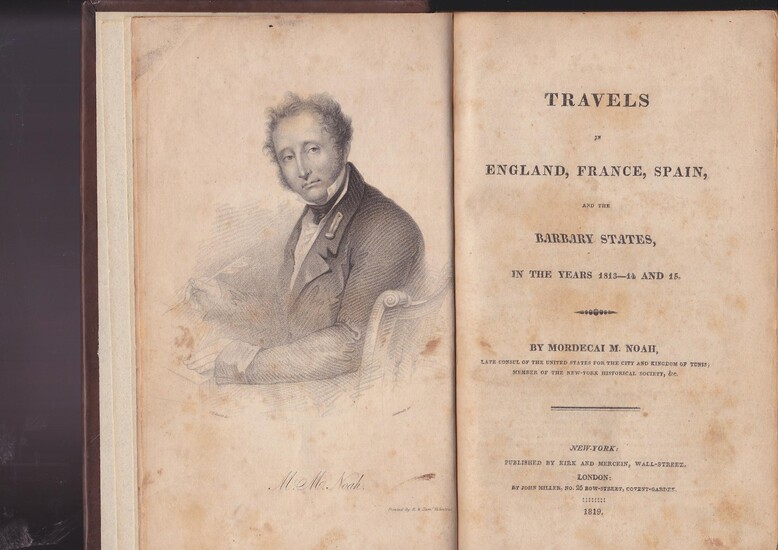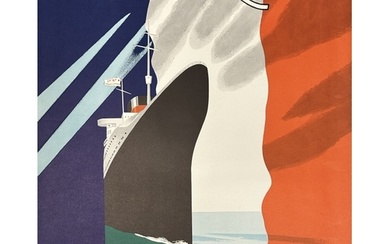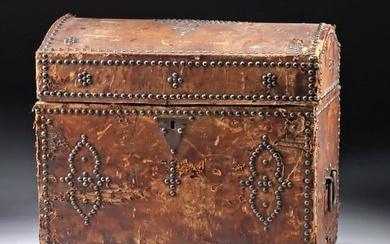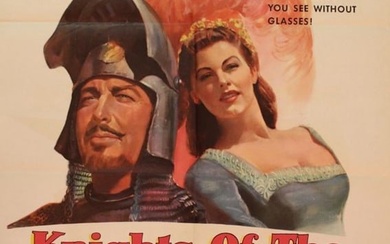Travels in England, France, Spain and the Barbary States in the years 1813-14 and 15
By Mordecai M. Noah
With engraved portrait frontis of the author, vi, (1) Errata, 431 pages, xlvii Appendix. Plates include: full page engraved view of Algiers, folding plate of engraving of The Fortress of Goletta near Tunis, full page engraving of Merchant Slave & Arab, and full page engraving of Abdallah American Drogaman. Foxing. The blank preceding frontispiece has two signatures and a clipping of some bookseller's listing: Daniel [?]i[?] Jr. 1820. The book is complete and has a very attractive modern full leather binding. Noah served as U.S. Consul to Tunis and was the first American Jew to receive an overseas diplomatic assignment. Descriptions of daily life and social customs of the Muslims and Jews comprise a valuable window into the intrigues of that historical time. Noah (1785-1851) was a lawyer, playwright, and journalist. He was born in Philadelphia of Portuguese-Jewish ancestry. "In 1813 [he] was appointed consul to Tunis, with a special mission to Algers. He was instructed to negotiate for the release of some Americans held as prisoners by the Algerine pirates. On May 23, 1813, he sailed from Charleston, but his vessel being captured by the British, he was taken to England and detained two months. In October he arrived in Cadiz, where he contracted with Richard R. Keene, an American who had become a Spanish subject, to effect the release of the twelve Americans After being detained in France and Spain for more than a year, Noah finally arrived in Tunis. On July 30, 1815, he received a letter from James Monroe, secretary of state, revoking his commission and hinting at irregularities in his accounts. Monroe's treatment of Noah was never satisfactorily explained, though his association with Keene, who had been accused of treason, was doubtless detrimental. In January 1817, however, Noah received a letter from the Department of State which vindicated his conduct and returned several thousand dollars due him in the enterprise which resulted in the release of the American captives" (DAB). Rosenbach 205; American Travellers Abroad, N17
Published by: Kirk and Mercein, 1819
Vendor: Meir Turner
Buy Now on
By Mordecai M. Noah
With engraved portrait frontis of the author, vi, (1) Errata, 431 pages, xlvii Appendix. Plates include: full page engraved view of Algiers, folding plate of engraving of The Fortress of Goletta near Tunis, full page engraving of Merchant Slave & Arab, and full page engraving of Abdallah American Drogaman. Foxing. The blank preceding frontispiece has two signatures and a clipping of some bookseller's listing: Daniel [?]i[?] Jr. 1820. The book is complete and has a very attractive modern full leather binding. Noah served as U.S. Consul to Tunis and was the first American Jew to receive an overseas diplomatic assignment. Descriptions of daily life and social customs of the Muslims and Jews comprise a valuable window into the intrigues of that historical time. Noah (1785-1851) was a lawyer, playwright, and journalist. He was born in Philadelphia of Portuguese-Jewish ancestry. "In 1813 [he] was appointed consul to Tunis, with a special mission to Algers. He was instructed to negotiate for the release of some Americans held as prisoners by the Algerine pirates. On May 23, 1813, he sailed from Charleston, but his vessel being captured by the British, he was taken to England and detained two months. In October he arrived in Cadiz, where he contracted with Richard R. Keene, an American who had become a Spanish subject, to effect the release of the twelve Americans After being detained in France and Spain for more than a year, Noah finally arrived in Tunis. On July 30, 1815, he received a letter from James Monroe, secretary of state, revoking his commission and hinting at irregularities in his accounts. Monroe's treatment of Noah was never satisfactorily explained, though his association with Keene, who had been accused of treason, was doubtless detrimental. In January 1817, however, Noah received a letter from the Department of State which vindicated his conduct and returned several thousand dollars due him in the enterprise which resulted in the release of the American captives" (DAB). Rosenbach 205; American Travellers Abroad, N17
Published by: Kirk and Mercein, 1819
Vendor: Meir Turner






